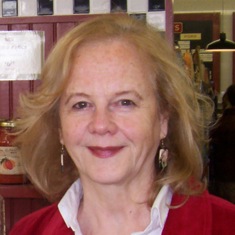If we could meet again
as strangers, I would ask
for more. Give me
something sacred to see
I would say, something
bold to bless.
Trick me into a patch
of passion, fling me
screaming, into blue
flame. Give me–
something wild
to hold onto.
Shake me dry
like a gourd until
my seeds clamor
and crack again, even
if all that's left
is dust.
If We Could Meet Again is a poem of ecstasy, of wanting to stay alive. It has its genesis in my continual striving to stay awake to life, to see things afresh.
I get this feeling again as summer approaches. A desire to break out, free up, go someplace, cast off the trappings and rituals of winter both physically and spiritually.
In summer I tend to break out of a type of linear thinking that defines much of my attitude during the school year. It's a safe pattern of thinking and acting that sometimes dictates my view of where I am and what I'm doing. As teachers, it's easy to get stuck in thinking this way as we puzzle over problems and issues across the year.
Fear can often accompany linear thinking. Fear that if we don't do things in a certain way, follow the usual pattern, we won't get it "right," or that we and the students won't get what we need. We won't meet or exceed expectations.
The last stanza of this poem reminds me of Annie Dillard's line in The Writing Life (1989), "We still and always want waking. We should amass half dressed in long lines like tribesmen (or women) and shake gourds at each other, to wake up . . ."
Let summer "shake us like a gourd." Let us be willing to break away from the ordinary that we may bring back a sense of renewal, of wide-awakeness, that says to the students, we're doing life work here, not just work for school.






